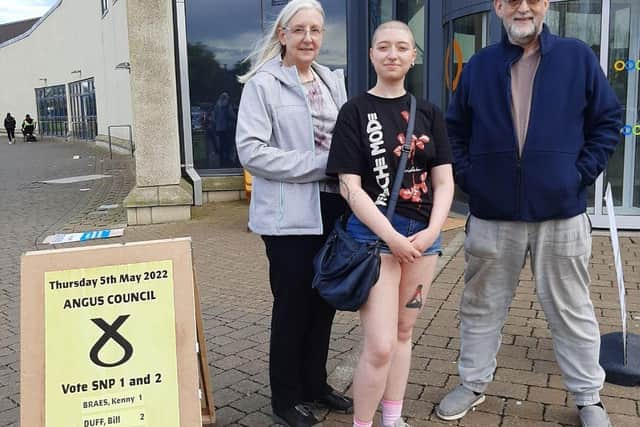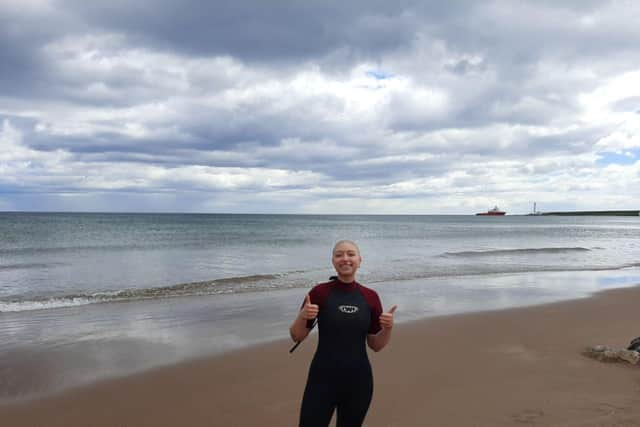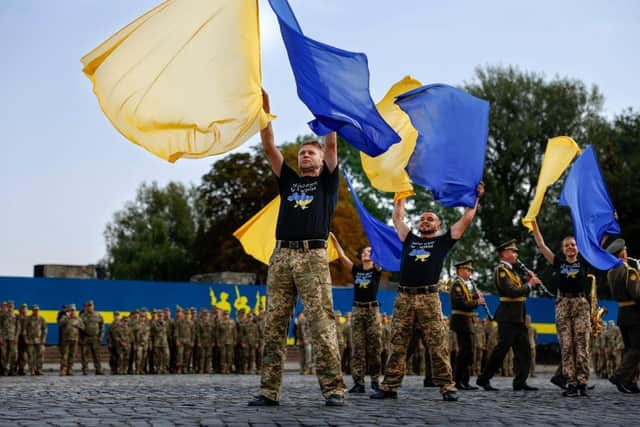War in Ukraine: Six months on from Russian invasion - 'for every Ukrainian, February 24 is regarded as the worst day of their lives'
She has already taken some text books out of the library to give herself a head start on her course and is looking forward to attending gigs she has bought tickets for with friends.
And just like her peers, she has mixed feelings – of excitement to start her new life as a student in Dundee, as well as sadness at leaving behind her home and the close-knit community in the small town of Montrose, in Angus.
Advertisement
Hide AdAdvertisement
Hide AdYet Ms Shevtsova is different to most of her fellow students in one respect. At the beginning of this year, she had never been to Scotland and was living with her parents in Kyiv, where she was studying social work – until war broke out, six months ago today.


The invasion of Ukraine by Russian troops has produced shockwaves across the world, ramping up tensions between Russia and the West, sparking fears of a new era of the Cold War, and an unparalleled energy crisis that has sent utility bills soaring across Europe.
On the morning of February 24, Ms Shevtsova was woken up by her mother, who broke to her the news the long-feared invasion had begun.
"I think for every Ukrainian, February 24 is regarded as the worst day of their lives,” she says. “When I speak to my parents now, no matter what the topic is that we speak about, the conversation always turns back to that day – and those early days of the war.”
The sheer scale of the invasion took everyone by surprise. While international observers had expected some movement of Russian troops into Ukraine, potentially in the east of the country, where conflict in the Donbas region had been going on since 2014, the number of attacks – and the geographic spread – was unexpected.


"We had been anxious for some time, due to Russia setting up its troops on our borders,” Ms Shevtsova says. “But when it happened, we were in shock. When my mother came into my room, the first thing I asked her was ‘has the war started?’ And she said ‘yes, daughter, it has. We must start packing’.”
The family fled to a bomb shelter in an underground Metro station, where, with hundreds of other people, they stayed for seven days, sleeping on the floor and surviving with little food and water.
Soon afterwards, Ms Shevtsova and her mother fled Kyiv, first to the western Ukrainian city of Lviv, then on to Poland and into Germany, where they stayed with relatives. Her mother is still living in Germany, while her father remains in Ukraine, where he is studying to turn his war-time volunteer role for the emergency services into paid employment.
Advertisement
Hide AdAdvertisement
Hide AdShe says: "The first couple of days I couldn't eat, I couldn't sleep. I was just shivering. Sometimes now, I can be doing something, doing the washing, or drinking something and I suddenly have this thought of that first morning. I can’t get rid of it.”


The date of August 24 has a further significance in Ukraine. Today also marks 31 years since it adopted the Act of Declaration of Independence of Ukraine – the day it began moves to formally leave Russian control amid the impending collapse of the Soviet Union in 1991.
However, celebrations this year have been muted, with authorities warning people to avoid crowds and ensure they follow air raid warnings. Some Ukrainians have stockpiled food and water amid fears of targeted attacks.
While Ukrainian troops have managed to stem the tide of Russian military movement into the capital, other areas have borne the brunt of the invasion. One Kyiv suburb, Bucha, saw mass destruction and its citizens endured unthinkable atrocities before Russian forces moved away from the region in March.
By May, a Ukraine counter-offensive had driven back Russian forces near the eastern city of Kharkiv. However, later that month, a prolonged siege and bloody battle at the Azov steelworks saw Mariupol fall to Russian troops.
The invasion has progressed and changed pace in recent months, with a back-and-forth tussle for areas in the east of Ukraine, which Russia sees as its key targets.
Moscow now occupies more of the eastern regions of Luhansk and Donetsk than it did before the war, when small portions of the regions were already under pro-Russian control. In some occupied cities, such as Kherson, Russian authorities have introduced the ruble as currency and enforced the Russian curriculum in Ukrainian schools.
Both sides have accused each other of war crimes, although those reportedly committed by Russia have been well documented. Russia is said to be responsible for atrocities such as a bombing of a theatre in Mariupol, where hundreds of people, including many children, were sheltering. The bombing of a shopping centre in Kremenchuk killed at least 20 people and injured dozens more.
Advertisement
Hide AdAdvertisement
Hide AdMs Shevtsova is one of more than 13,000 refugees who have left behind their lives in Ukraine to begin a new one in Scotland. At least 12 million are estimated to be living in other countries, including border nations of Poland, Romania and Moldova – but also as far away as the US, Canada and Australia.
When Ms Shevtsova stepped off the plane at Edinburgh Airport in April, she was one of the first Ukrainians to arrive in Scotland under the Homes for Ukraine visa scheme. The scheme required refugees to match in advance with a British sponsor, who would agree to take them into their homes.
Scotland quickly set up an add-on to the scheme, allowing those fleeing the war to name the Scottish Government as a sponsor. However, the scheme was paused in June, due to a backlog in refugees being processed. Many have been living in hotels for months, while the Government has leased a cruise ship docked in central Edinburgh to temporarily house hundreds of people, and plans to open a second in Glasgow in September.
While more than 10.5 million border crossings have been made out of Ukraine since February, around 4.5 million people have crossed to return. While some of those are refugees living in nearby countries such as Poland, who want to visit to check on family or property, others have returned for good.
As Ukrainian men aged 18 to 60 are legally not allowed to leave the country in case they are needed for the war effort, some families have decided to take their chances together, rather than remain separate indefinitely.
In Kyiv and other parts of Ukraine that have not been occupied by Russia, cafes, cinemas, offices and shops are now open. Ukrainians who have stayed at home are clinging to a semblance of normality.
Yet life is far from normal. Mobile phone apps alert citizens to attacks, with a new colour coding system brought in earlier this week to expand the alerts from simply air raids, to include chemical and radiation warnings, as well as – the now nightly – air raid alerts or artillery fire.
Since the war began, patriotic Ukrainians have distanced themselves from Russian links.
Advertisement
Hide AdAdvertisement
Hide AdUkrainian language lessons run by local libraries for Russian speakers are said to be booming, while schools in Kyiv have pledged to scrap Russian language lessons when the new term starts in September.
Ms Shevtsova has spent the past four months living with volunteer hosts Harry and Catriona Smart.
While their formal hosting agreement will end when she leaves for Dundee in September, she says she will still regard their house as “home” and will occasionally return, as many students do, for a freshly cooked meal and some home comforts.
She regards every day as a lucky chance to enjoy a normal teenage life. She has taken up wild swimming with a local group in Montrose and is enjoying the Scottish music scene. She has also taken a paid job with a charity to help other Ukrainians integrate into life in Scotland and also volunteers at a local group for new Ukrainian refugees.
"I have survivor’s guilt,” she says. “My life is definitely different. But also I can see that the difficult situation gave me so many opportunities. I think I didn’t suffer like people in Mariupol and other regions, so why do I deserve this? Then I remember I was living in a bomb shelter and I try to push it away and enjoy my life.
"I am also very nervous about the state of the world, about China and Taiwan and Serbia and Kosovo. Every news story worries me as I know how unpredictable it can be.”
Comments
Want to join the conversation? Please or to comment on this article.
